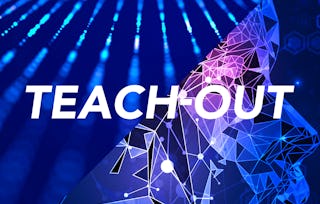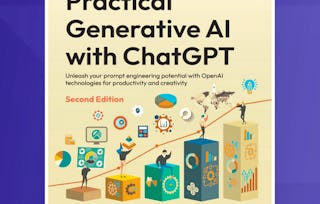Get to know the history of Artificial Intelligence and learn how to effectively use ChatGPT using different strategies to implement its responsible use in educational and work environments. Analyze different practical examples and apply your knowledge to complement your operational activities increasing your productivity. Study the ethical considerations, capabilities and limitations of platforms such as ChatGPT, enabling you to make conscious and responsible use of AI-assisted platforms.

ChatGPT - Uses and Strategies
Ends soon: Gain next-level skills with Coursera Plus for $199 (regularly $399). Save now.

ChatGPT - Uses and Strategies


Instructors: Olaf Román
Top Instructor
2,161 already enrolled
Included with
(14 reviews)
Skills you'll gain
Details to know

Add to your LinkedIn profile
See how employees at top companies are mastering in-demand skills

There are 4 modules in this course
In this first topic we will review Artificial Intelligence (AI), which encompasses scientific, computer, and technological concepts that currently allow automating tasks and processes in educational, industrial, and work environments. The origins of AI date back to the 1930s, having its main milestones and developments from the 1990s to the present.
What's included
2 videos13 readings4 assignments1 discussion prompt
ChatGPT is an Artificial Intelligence assisted tool that allows to generate content through text in natural language. Through an intuitive interface and an interactive communication channel, today it offers millions of users around the world great opportunities and benefits to complement and enhance activities in educational and work environments.
What's included
2 videos10 readings3 assignments1 discussion prompt
This third topic explores the revolutionary impact of ChatGPT in the education and labor sectors leading to much interest and debate about its potential to accelerate transformation in these sectors. AI's capabilities are impressive when it comes to understanding natural language, answering questions, summarizing text, and creating new content thereby opening new opportunities to innovate in teaching and improve work efficiency, but at the same time there are concerns about its ethical use. Educators and employers should carefully consider how to implement ChatGPT in a way that promotes, rather than undermines, human input and creativity.
What's included
2 videos9 readings3 assignments1 peer review1 discussion prompt
This fourth theme focuses on deepening our understanding of the capabilities of ChatGPT, while emphasizing the need for an ethical approach to its use. Through critical analysis, we will address the challenges and controversies emerging around AI, highlighting the importance of sound ethical principles and strategies for its responsible implementation. The discussion extends beyond theoretical frameworks, putting forward concrete action plans that align technology with educational and organizational goals, thus promoting an effective and ethical integration of AI into our lives.
What's included
3 videos10 readings5 assignments1 discussion prompt
Instructors

Offered by
Explore more from Data Management
 Status: Free
Status: FreeUniversity of Michigan
 Status: Preview
Status: Preview Status: Preview
Status: PreviewUniversity of Pennsylvania
Why people choose Coursera for their career




Frequently asked questions
To access the course materials, assignments and to earn a Certificate, you will need to purchase the Certificate experience when you enroll in a course. You can try a Free Trial instead, or apply for Financial Aid. The course may offer 'Full Course, No Certificate' instead. This option lets you see all course materials, submit required assessments, and get a final grade. This also means that you will not be able to purchase a Certificate experience.
When you purchase a Certificate you get access to all course materials, including graded assignments. Upon completing the course, your electronic Certificate will be added to your Accomplishments page - from there, you can print your Certificate or add it to your LinkedIn profile.
Yes. In select learning programs, you can apply for financial aid or a scholarship if you can’t afford the enrollment fee. If fin aid or scholarship is available for your learning program selection, you’ll find a link to apply on the description page.
More questions
Financial aid available,
¹ Some assignments in this course are AI-graded. For these assignments, your data will be used in accordance with Coursera's Privacy Notice.






